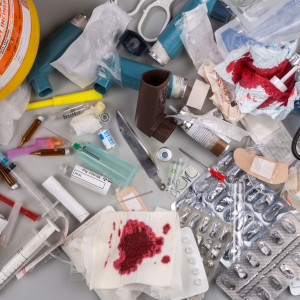Beyond Dawlish

Proper needle waste disposal is a critical aspect of healthcare and environmental safety. Needles, syringes, and other sharp objects, collectively known as "sharps," pose significant risks if not disposed of correctly. Ensuring the safe and effective disposal of needle waste is essential to protect public health, prevent injuries, and maintain compliance with regulatory standards. This article explores effective solutions for needle waste disposal, highlighting best practices and strategies to ensure safety.
Understanding the Importance of Needle Waste Disposal
Needle waste disposal is crucial for several reasons:
Preventing Injuries: Improper disposal of needles can lead to accidental needle-stick injuries, which may expose individuals to bloodborne pathogens such as HIV, hepatitis B, and hepatitis C.
Protecting Public Health: Proper disposal minimizes the risk of contamination and infection, safeguarding both healthcare workers and the general public.
Environmental Safety: Disposing of needles and other sharps correctly prevents environmental contamination, ensuring that hazardous materials do not end up in landfills or water supplies.
Regulatory Compliance: Adhering to local, state, and federal regulations regarding needle waste disposal is essential for healthcare facilities to avoid fines and legal issues.
Best Practices for Needle Waste Disposal
To ensure safety and compliance, healthcare facilities and individuals must follow best practices for needle waste disposal:
Use Approved Sharps Containers: Always dispose of needles in FDA-approved sharps containers. These containers are puncture-resistant, leak-proof, and designed to be safely handled and disposed of.
Do Not Reuse Containers: Sharps containers are for single use only. Reusing containers can compromise their integrity and increase the risk of injury.
Seal and Label Containers: Once a sharps container is three-quarters full, it should be sealed and labeled appropriately. This ensures that anyone handling the container is aware of its contents and the potential hazards.
Proper Disposal Methods: Depending on local regulations, sharps containers can be disposed of through mail-back programs, drop-off sites, or professional medical waste disposal services. Always follow the guidelines provided by local health departments.
Training and Education: Healthcare facilities should provide regular training for staff on proper needle waste disposal procedures. Education ensures that everyone is aware of the risks and the correct methods for disposal.
Innovative Solutions for Needle Waste Disposal
As technology advances, new solutions for needle waste disposal are emerging:
Self-Sealing Sharps Containers: These containers are designed to automatically seal when full, reducing the risk of overfilling and accidental exposure.
Needle Destruction Devices: These devices incinerate needles at the point of use, rendering them non-hazardous and significantly reducing the volume of waste.
Integrated Waste Management Systems: Some healthcare facilities are adopting integrated systems that track waste from generation to disposal, ensuring compliance and improving efficiency.
The Role of Individuals in Needle Waste Disposal
Individuals who use needles at home, such as those managing diabetes or other medical conditions, also play a vital role in safe needle waste disposal. They should:
Follow Proper Disposal Protocols: Use a sharps container for needle disposal and never dispose of needles in household trash.
Utilize Community Resources: Take advantage of community drop-off sites or mail-back programs for safe disposal.
Educate Themselves: Stay informed about local regulations and resources for needle waste disposal to ensure they are following the best practices.
Effective needle waste disposal is essential for protecting public health, ensuring environmental safety, and maintaining regulatory compliance. By following best practices and adopting innovative solutions, healthcare facilities and individuals can significantly reduce the risks associated with improper needle disposal. Through education, proper handling, and the use of approved disposal methods, we can ensure the safe and effective management of needle waste.




